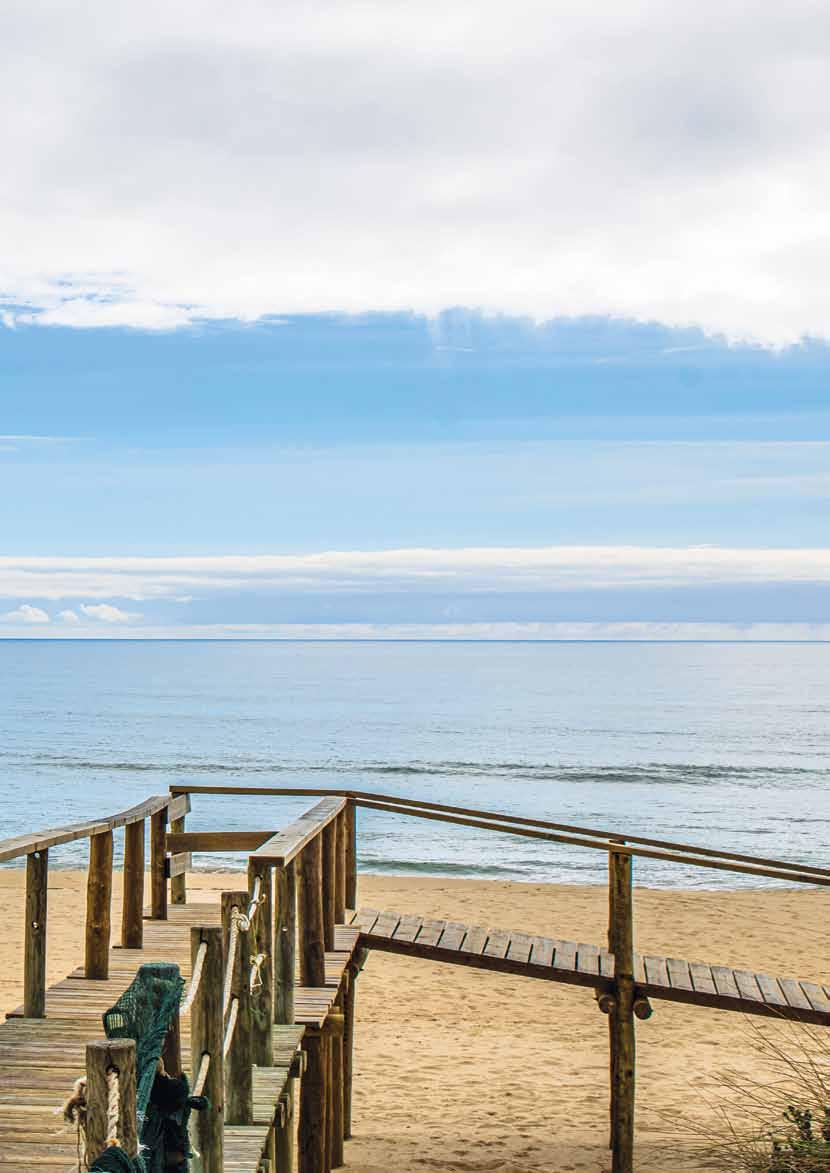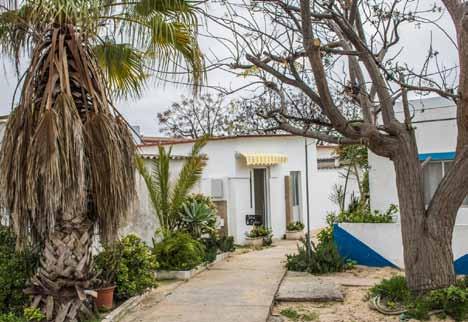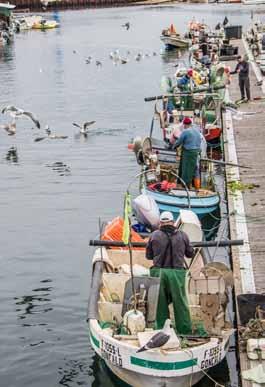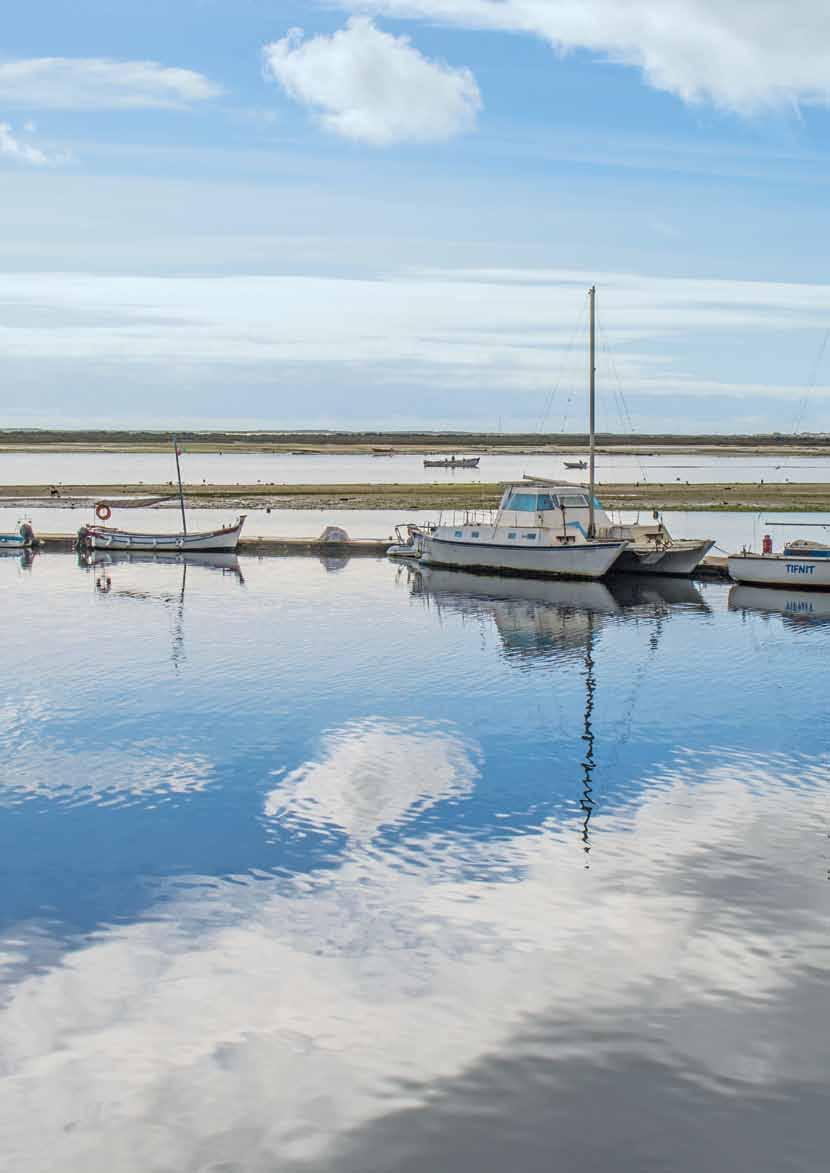
4 minute read
Insider knowledge
Laid back island life at Culatra
Forming a barrier between the Ria Formosa lagoon and the open Atlantic Ocean are a number of small islands. Culatra is the favourite of Marketing Manager, Angela Viegas, who describes it as her secret refuge. It’s easily reached from Faro or Olhão by ferry or water taxi, but remains unknown to most tourists.
Angela rents a fisherman’s cottage there for her summer holidays and loves it because it’s safe for her children, aged nine and ten. There is no traffic. Once the day-trippers have left, it’s just an established community of fishing families who have lived there all their lives. “On Culatra, my kids feel free” says Angela. “Each day we order the next day’s bread, which they like to go and collect. And at the end of the day their treat is to go and buy an ice cream.
From Culatra, you can see civilisation and the bright lights of the mainland, but you can’t touch it.”
The island has two distinct sides to its personality. The northern side, where you get off the ferry, is more sheltered with calm waters and a harbour where you’ll find fishermen mending their nets, and flocks of seagulls attracted by the fish. Angela’s favourite side of the island, however, is the wilder ocean side on the south, with beautiful unspoilt scenery of dunes and marshland and pristine, empty beaches. Turn right at Rui’s Restaurant and keep going straight across the island until you come to a small beach bar with beds and umbrellas.
“My idea of holiday heaven is to go to the beach in the morning and then have a fish lunch of Peixe Aranha (spider fish)” says Angela. “Rui’s Restaurant is the only place I know that serves this hard to find speciality.”
“There’s also a local patisserie – well, actually it’s just a room in someone’s house, and it’s not open every day – that serves the most delicious Jesuites”. These sweet pastries are seen more often in the north of Portugal and are triangular flaky pastry parcels with almond cream filling. The name refers to the shape of a Jesuit’s hat. “On Culatra, you get real Portuguese food” says Angela, “and that’s the way I like it.”
So, if you want to experience a simpler Portuguese way of life, where you are surrounded by nature and its authentic beauty, head to Culatra for the day.

Férias descontraídas na Culatra
Entre a Ria Formosa e o oceano Atlântico existe uma barreira formada por pequenas ilhas. A ilha da Culatra é a preferida de Ângela Viegas, a nossa Diretora de Marketing, que a descreve como o seu refúgio secreto. É um destino facilmente acessível através de ferries que saem regularmente de Faro e Olhão, ou por táxi marítimo, mas a maioria dos turistas desconhece-a.
Ângela costuma ficar numa das pequenas casas de pescadores existentes na ilha para passar as suas férias de verão e adora fazê-lo por ser seguro para os filhos, de nove e dez anos de idade. Não há trânsito. E assim que os visitantes diurnos partem ao fim do dia, fica apenas a coesa comunidade de famílias de pescadores que sempre lá morou. “Os meus filhos sentem-se livres na Culatra”, afirma Ângela. “Encomendamos diariamente o pão para o dia seguinte e eles gostam de o ir buscar. E no final do dia, deleitam-se comprando um gelado. Da Culatra avistamos a civilização e as suas luzes brilhantes, mas não lhes podemos tocar.”
A ilha tem duas facetas distintas. O lado norte, onde se desembarca do ferry, é mais protegido, com águas calmas e um porto onde encontramos pescadores a remendar



redes e bandos de gaivotas atraídas pelo peixe. Mas Ângela prefere o lado sul, virado ao Atlântico, mais selvagem, com incríveis e vastas extensões de dunas e lodaçais e intocadas praias desertas. Virem à direita a seguir ao Restaurante do Rui e continuem em frente, atravessando a ilha, até encontrarem um pequeno bar de praia com espreguiçadeiras e sombrinhas.
“A minha ideia de férias é ir à praia de manhã e depois deleitar-me com um almoço de peixe-aranha”, diz Ângela. “O Restaurante do Rui é o único lugar que conheço que serve esta rara iguaria.”
“Há também uma pastelaria – bem, efetivamente é apenas uma sala da casa da proprietária, e não está aberta o dia inteiro – que serve uns jesuítas deliciosos.” Estes deliciosos triângulos de massa estaladiça recheada com creme de amêndoa são mais comuns
no norte de Portugal e o seu nome deriva da forma triangular dos chapéus dos padres Jesuítas. “Na Culatra a comida é genuinamente portuguesa”, afirma Ângela, “ e é assim que eu gosto.”
Se quiserem, portanto, ter um gostinho de uma portugalidade mais singela, rodeados pela natureza e a sua autêntica beleza, rumem à Culatra por um dia.
Covid 19 status
All boats to Culatra are running as usual. Cafés and bars are also open. Masks will be required. Covid-19 atualização
Barcos continuam a operar no horário habitual. Cafés e bares estão abertos com o uso obrigatório de máscaras.







